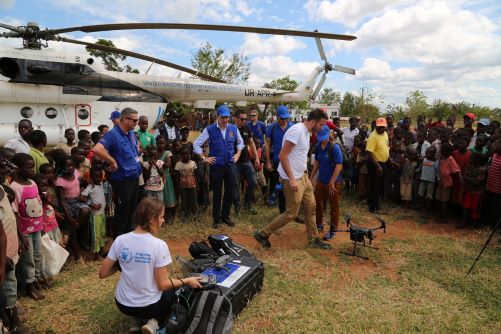WFP thanks European Union for supporting response to Mozambique cyclone and flooding
Beira/Maputo - The United Nations World Food Programme (WFP) today welcomed a European Union contribution of €1 million support of the WFP-led global Logistics Cluster’s work on behalf the humanitarian community to bring emergency relief to the people of Mozambique in the aftermath of Cyclone Idai and subsequent flooding.
Tropical Cyclone Idai, which hit the port city of Beira on 14 March, and days of torrential rains that followed devastated homes, essential infrastructure and crops across Sofala, Manica, Zambezia and Tete provinces, leaving at least 1.8 million Mozambicans in need of urgent food assistance.
The funding from the European Union’s Civil Protection and Humanitarian Aid Operations (ECHO) is being invested in the logistical underpinnings of the emergency response being coordinated by the INGC, the national disaster management agency. WFP has deployed to Beira three MI-8 transport helicopters and a C-295 freight aircraft to support the broader humanitarian response. They are being used to move food, water, medicines, tents and other essentials, as well as humanitarian personnel.
“The magnitude of the destruction caused by Idai leaves no trace of doubt: humanitarian needs are enormous. And logistics are crucial in helping to save more lives and support the post-disaster recovery and reconstruction efforts,” said WFP Country Representative, Karin Manente. “We are thankful to the European Union for supporting the people of Mozambique and the humanitarian community.”
“For the EU, it is a priority to support natural disaster management in one of the most disaster-prone countries in the world, as is Mozambique," said Ambassador Antonio Sanchez-Benedito, Head of the EU Delegation to Mozambique. "To this end, the EU can count on the long-standing expertise of partners like WFP to provide essential assistance to national authorities after a disaster.”
The present EU financial support comes on top of an €800,000 EU-funded project that is enabling WFP to support the strengthening of national capacities for early warning and preparedness through disaster risk mapping, post-emergency rapid assessment and early recovery.
In 2018, WFP led multiple trainings for technical staff from the INGC and relevant government ministries in how to fly, map, and coordinate the use of Unmanned Aerial Vehicles (UAVs), or drones.
EU-supported drone mapping of damage and needs is a key element of WFP’s current support to the INGC. A WFP drone pilot has so far assessed damage to critical infrastructure – including hospitals, clinics, roads and bridges – and identified elevated and low-lying areas where the displaced can and should not return.
Drone assessments of Beira’s schools and of areas deemed at high risk of cholera are to be undertaken this week.
# # #
The United Nations World Food Programme - saving lives in emergencies and changing lives for millions through sustainable development. WFP works in more than 80 countries around the world, feeding people caught in conflict and disasters, and laying the foundations for a better future.
Follow us on Twitter: @wfp_mozambique; @WFP_Africa
The European Union and its Member States are the world’s leading donor of humanitarian aid. Relief assistance is an expression of European solidarity with people in need all around the world. Through its Civil Protection and Humanitarian Aid Operations (ECHO), the European Union helps millions of victims of conflict and distasters every year. With headquarters in Brussels and a global network of field offices, the EU provides assistance to the most vulnerable people on the basis of humanitarian needs.
Follow us on Twitter: @eu_echo

